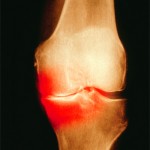Dr. Mastbergen was asked why he thinks the procedure hasn’t been adopted more widely, since it really does appear that regeneration is taking place.
“People need to be convinced whether it’s actually happening—for such a long time there was a belief that it couldn’t be regenerated,” he said. “I think the last couple of years … there is more belief in the treatment and we’re now working together with some of our collaborators [in the U.S.] and other groups [in Japan and Germany] to actually get it more implemented.”
He added, “We try to talk about it as much as possible.”
Mesenchymal Stem Cells to Drive Repair
Elena Jones, PhD, associate professor at the Leeds Musculoskeletal Biomedical Research Unit in Leeds, U.K., discussed the potential of a “one-step” surgical procedure using mesenchymal stem cells (MSCs)—known to drive bone and cartilage repair—in patients with osteoarthritis.
The procedure is based on findings that MSCs exist in abundance in bone, the synovium, and synovial fluid, so that “the use of exogenously added, culture-expanded cells might not be necessary,” she said.
“We believe, in our lab, that instead of going this long way around in tissue-culture expansion, we could simply modulate MSC attachment to cartilage defects. Alternatively, we could extract MSCs from fresh tissue, and then replant in a one-day procedure, bypassing all long culture-expansion stages, making therapy much more cost effective—and also a single-surgery procedure, which is very beneficial,” Dr. Jones said.
She and her research team have developed a flow cytometry assay, “in which, in 40 minutes, we can tell the dose of MSCs in this particular sample of bone marrow aspirate,” she said. There has been excellent correlation between their assay and the typical, two-week-long colony assay to count MSCs.
“So, we actually think that tissues currently discarded by surgeons can be used in the future for repairing bone and cartilage,” she said, adding that allogeneic applications might be possible as well.
Does Synovium Hold the Key to Cartilage Repair?
Cosimo De Bari, MD, PhD, Professor and Chair of Medicine and Therapeutics at the University of Aberdeen, talked about the importance of the synovium as a producer of mesenchymal stem cells for cartilage repair—calling them possibly the “ideal chondroprogenitor” in this process.
Part of what makes the synovium so powerful in this regard, he said, is that it shares a common embryonic derivation with the joint surface.
Dr. De Bari and his research team published findings in 2011 showing the presence of endogenous resident MSCs in adult mouse knee joints—slow-cycling cells that proliferate and differentiate after injury to the joint.2
